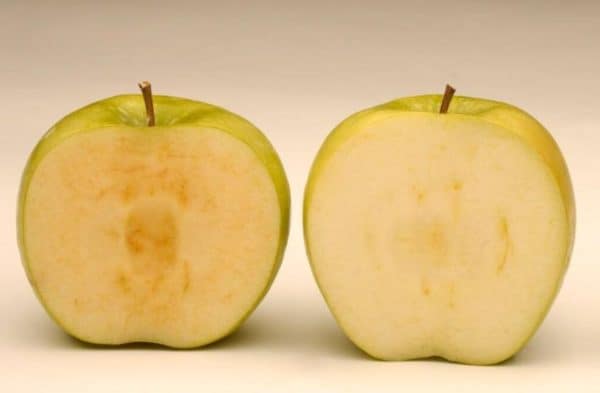
 Grocery stores in the United States are about to get their first bite out of the Arctic apple.
Grocery stores in the United States are about to get their first bite out of the Arctic apple.
The genetically modified, non-browning apple created by the BC company, Okanagan Specialty Fruits. And if they pass the taste test south of the border, expect to see Arctic apples in Canadian stores in the near future, says company founder and president, Neil Carter, who doesn’t think the GMO attribution will hold back consumers.
“We see this as less about genetic modification and more about convenience,” says Carter. “I think consumers are very ready for apples that don’t go brown. Everyone can identify with that ‘yuck’ factor.”
Arctic apples have been genetically altered to keep them from producing the enzyme that causes oxidization.
They received a ruling from the US Department of Agriculture in February 2015 that the product posed no significant health and environmental risks, paving the way for their launch next week at ten locations in the US Midwest. The product was also given approval by Health Canada in 2015.
Arctic apples will be sold pre-sliced in “grab-and-go” packaging, without visible evidence of its GMO origin. Instead, the package will be marked with a code which, if scanned, will lead interested consumers to information on the company’s website. Carter spoke to CBC News and denied that the company is hiding information on the GM technique used to create the apple, saying rather, “We don’t want to demonize the product by putting a big GMO sticker on it.”
Carter says that the trial run will determine how and when the company will proceed in Canada, a move which might still be a couple of years away. “We’ll learn from our American experience and we’ll bring that to Canada,” says Carter.
Genetically modified products have been part of the North American agricultural market for decades, yet experts say that a lot is riding on the Arctic apple’s debut.
Many of the most common GMOs like corn, soy, canola and sugar beets appear in stores within processed foods, rather than as stand-alone fresh produce. And thus, consumers will be now faced with an immediate choice concerning a single GM product.
“The Arctic apple is about to become the symbol of the great national and possibly global debate over GMOs,” said McKay Jenkins, professor at the University of Delaware and author of Food Fight: GMOs and the Future of the American Diet. “Really the issue is not so much about the apple itself, the question is whether the public will buy something that is a GMO. Will the public happily buy into a GMO product?”
A 2012 poll by the BC Fruit Growers’ Association showed that the public is still uneasy with the GMO concept.
A reported 76 per cent of respondents didn’t feel adequately informed by the government about genetically modified foods, 71 per cent wanted the government to keep GM products out of some categories like milk and fruit, and when asked about the idea of the Arctic apple itself, 69 per cent of respondents opposed its approval.
At the time, the CBC reported that Carter believed that the poll showed the need for better consumer education on GM foods. ”We need to spend more time educating the public on biotechnology, on its use in food,” said Carter.
Comment
Leave a Reply
You must be logged in to post a comment.





 Share
Share Tweet
Tweet Share
Share




Like yellow rice this apple is a Trojan horse with no purpose.
It needs to be BANNED,
“Everyone can identify with that ‘yuck’ factor.” These apples are the perfect example!
“Improving” an apple so that it doesn’t show bruse deterioration means that apple that are overage will be foisted off on customers who are not informed that they are GMO mutants.